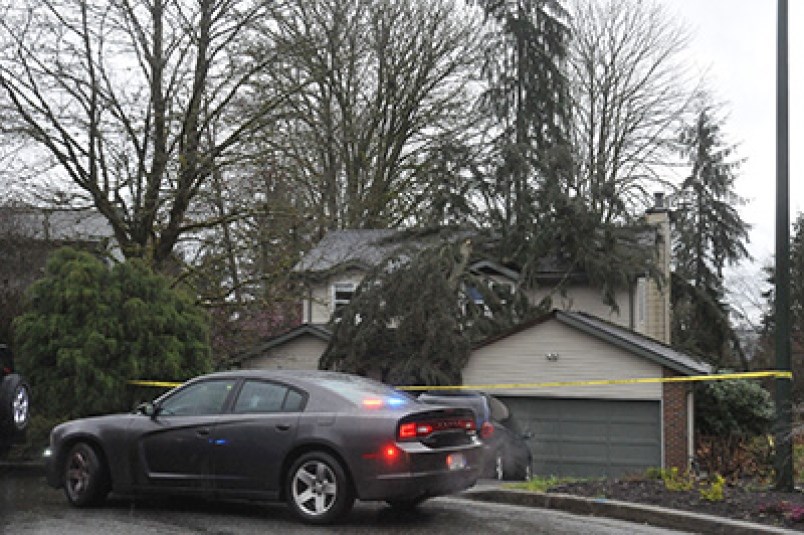The family of a Port Moody woman who died when a tree fell on her house during a windstorm two years ago is suing the Greater Vancouver Water District and an arborist for failing to deal with problem trees.
Jill Calder, 57, was at home with her husband when the tree came down at about 6:30 a.m. March 10, 2016 on their Alpine Place home, located just off Noons Creek Drive, pinning her inside. Calder was the longtime executive director of the New View Society, the Port Coquitlam-based community mental health organization.
According to the plaintiffs, Kenneth and James Calder, Jill Calder was asleep in her bed when the incident occurred.
The lawsuit filed March 6 alleges the GVWD and an arborist failed to take steps to address risks posed by a 115-foot hemlock tree even though the plaintiffs' father notified it in 2012 or 2013 that the tree displayed signs of declining health, and the defendants acknowledged there was rot and that if it fell onto the property it would be “catastrophic.”
“Apart from marking the hemlock, the defendants failed to take any steps to address any of the risks posed by the hemlock,” the suit states.
The lawsuit also alleges the defendants had known that five to six trees had fallen on the land previously, and cleaned up the area after a limb fell on the Calder yard “but otherwise failed to take any steps to address any of the risks posed by the trees.”
In their suit, the plaintiffs say they have suffered psychological injuries, loss of support, loss of homemaking and household assistance; loss of inheritance; loss of care, guidance and companionship; loss of income; medical expenses; care costs; and costs to replace or repair personal property.
The suit seeks special costs, court costs and damages. None of the allegations in the suit has been tested in court.
Metro Vancouver spokesperson Don Bradley, whose organization is responsible for the GVWD and the land, which is a potential reservoir site, said he can’t speak about the lawsuit.
But he said the death of Jill Calder “was an unthinkable tragedy with devastating impacts on her family, friends and the community. Our thoughts and condolences remain with her loved ones.”
As well, Bradley stated in an email to The Tri-City News that Metro Vancouver is committed to protecting public health and safety as well as preventing property damage from inherent forest risks, It also “responds to concerns from the public and assesses the situation and risk and takes the appropriate course of action in the public interest.”
Since the tragedy, Metro Vancouver has undertaken a comprehensive review of the tree management practices of its four legal entities and has approved a tree management plan that exceeds best manage practices. The new policy is being implemented “consistently across the entire organization,” Bradley further stated.
“Metro Vancouver owns vast amounts of forested lands, much of which is publicly accessible for recreational activities/and or in close proximity to key utility infrastructure and residential developments. We are diligent in maintaining our properties to the very best of our ability,” he said in his email.



